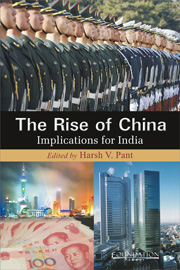8 - Sino-Indian Territorial Issues: The “Razor's Edge”?
from Part III - China's India Policy
Published online by Cambridge University Press: 05 June 2012
Summary
In terms of “the rise of China” and its “implications for India”, the title of this book, the Sino-Indian territorial dispute represents an immediate arena in which India is having to face the uncomfortable implications from having an increasingly stronger neighbour. For India, the ability of China to deny India's hopes of territorial settlement on India's terms has become even clearer in the wake of China's rise in military power in and around her disputed territory, which remains the biggest amount of land still in dispute in Asia. As such,
the 4056-kilometre (2520 miles) frontier between India and China, one of the longest interstate borders in the world, remains… not defined, let alone demarcated, on maps or delineated on the ground.
Here, the judgement over a century ago, of Lord Curzon, British Viceroy of India 1898-1905 still seems relevant:
the most urgent work of Foreign Ministers and Ambassadors… is now the conclusion of Frontier Conventions in which sources of discord are removed by the adjustment of rival interests or ambitions at points where the territorial borders adjoin,… frontiers are indeed the razor's edge on which hang suspended the modern issues of war or peace, of life or death to nations.
- Type
- Chapter
- Information
- The Rise of ChinaImplications for India, pp. 195 - 217Publisher: Foundation BooksPrint publication year: 2012



